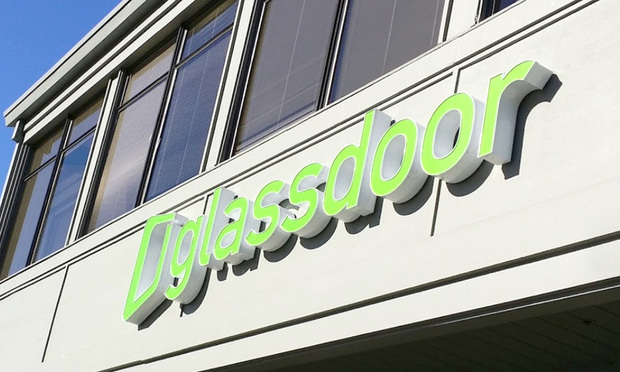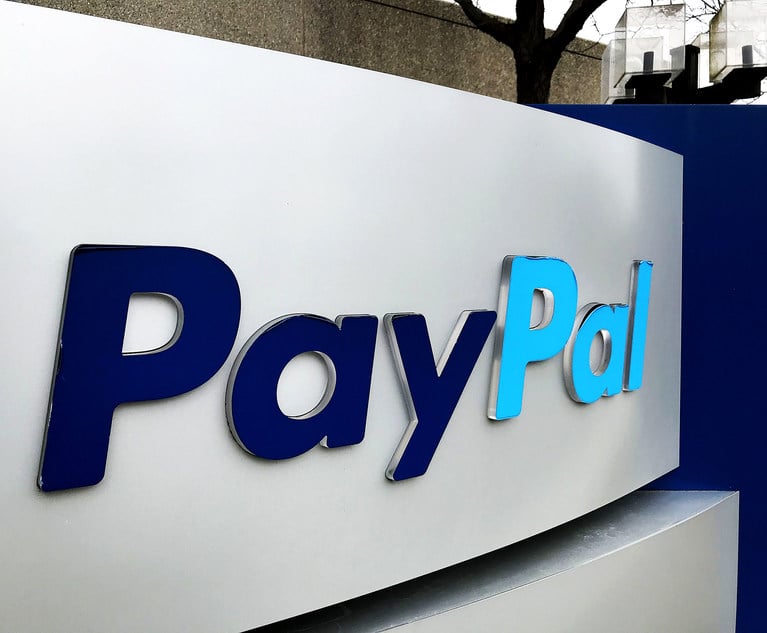Glassdoor Inc. Can't Shake Grand Jury Subpoena Unmasking Anonymous Users
Glassdoor Inc., the online job-review site, must comply with a federal grand jury subpoena that seeks identifying information about anonymous users of the website, a federal appeals court ruled Wednesday in rejecting the company's privacy claims.
November 08, 2017 at 03:33 PM
4 minute read

Updated at 3 p.m. Pacific
Glassdoor Inc., the online job-review site, must comply with a federal grand jury subpoena that seeks identifying information about anonymous users of the website, a federal appeals court ruled Wednesday in rejecting the company's privacy claims.
A panel of the U.S. Court of Appeals for the Ninth Circuit upheld an Arizona trial judge who had denied Glassdoor's effort to quash the grand jury subpoena. The government is seeking information about eight users who posted anonymous reviews about a federal health care contractor under investigation for fraud.
San Francisco-based Glassdoor, represented by a team from Perkins Coie, argued that complying with the subpoena would violate its users' First Amendment rights to anonymous free speech and to associate privately with a group, a concept known as “associational privacy.”
Writing for the panel, Judge Richard Tallman described Glassdoor's associational privacy argument as “tenuous.” U.S. Supreme Court precedent “contemplates groups of people who have associated to advance shared views or 'join in a common endeavor,'” Tallman wrote, “not people who happen to use a common platform to anonymously express their individual views.”
“Given the nature of Glassdoor.com, it is difficult to see its users as an expressive association like the Jaycees, the Boy Scouts, or the NAACP. Glassdoor's users are necessarily strangers to each other, because they are anonymous,” Tallman said. “Users do not so much 'discuss' employment conditions as independently post their individual views.”
Perkins Coie partner Eric Miller, chairman of the firm's appellate practice, declined to comment.
Glassdoor said in a statement the company was disappointed by the court's decision. The statement said in part: “We argued that the lower court applied the wrong standard in placing the interests of government ahead of Americans' protected free speech rights under the First Amendment. We had hoped to persuade the Ninth Circuit Court to require a higher standard for these requests.”
The panel also sustained a contempt order subjecting Glassdoor to a $5,000 sanction for each day it did not turn over the requested information to the government. The district judge stayed enforcement of the monetary sanctions pending the outcome of Glassdoor's appeal to the Ninth Circuit.
 Bradley Serwin, Glassdoor general counsel
Bradley Serwin, Glassdoor general counselGlassdoor general counsel Brad Serwin in June told The National Law Journal that the dispute tested the balance between the online speech and the government's power to collect information in a criminal investigation.
“We want to have the Ninth Circuit reaffirm that the government has to show that it has a compelling interest in the information it seeks and that information has a sufficient connection to the government's investigation,” Serwin said then. “Without this reaffirming this standard, the government could potentially demand user information without considering the user's First Amendment rights.”
Serwin said the company actively protects users' “right to speak anonymously about their workplace and company leadership. It's very unusual for the government to ask for identification of our users.”
Regardless of how the court ruled, Serwin said then, “Glassdoor will continue to fight for our users' rights. A loss could have some chilling effect, but as long as we continue to fight each and every case, we will continue to support a vibrant user community.”
Cheryl Miller contributed reporting from Sacramento.
Read more:
Glassdoor's GC Warns of 'Chilling Effect' in Subpoena Dispute With Feds
This content has been archived. It is available through our partners, LexisNexis® and Bloomberg Law.
To view this content, please continue to their sites.
Not a Lexis Subscriber?
Subscribe Now
Not a Bloomberg Law Subscriber?
Subscribe Now
NOT FOR REPRINT
© 2025 ALM Global, LLC, All Rights Reserved. Request academic re-use from www.copyright.com. All other uses, submit a request to [email protected]. For more information visit Asset & Logo Licensing.
You Might Like
View All
'It's Not Going to Be Pretty': PayPal, Capital One Face Novel Class Actions Over 'Poaching' Commissions Owed Influencers

'Tragedy of Unspeakable Proportions:' Could Edison, DWP, Face Lawsuits Over LA Wildfires?
7 minute read

Meta Hires Litigation Strategy Chief, Tapping King & Spalding Partner Who Was Senior DOJ Official in First Trump Term
Trending Stories
- 1'It's Not Going to Be Pretty': PayPal, Capital One Face Novel Class Actions Over 'Poaching' Commissions Owed Influencers
- 211th Circuit Rejects Trump's Emergency Request as DOJ Prepares to Release Special Counsel's Final Report
- 3Supreme Court Takes Up Challenge to ACA Task Force
- 4'Tragedy of Unspeakable Proportions:' Could Edison, DWP, Face Lawsuits Over LA Wildfires?
- 5Meta Pulls Plug on DEI Programs
Who Got The Work
Michael G. Bongiorno, Andrew Scott Dulberg and Elizabeth E. Driscoll from Wilmer Cutler Pickering Hale and Dorr have stepped in to represent Symbotic Inc., an A.I.-enabled technology platform that focuses on increasing supply chain efficiency, and other defendants in a pending shareholder derivative lawsuit. The case, filed Oct. 2 in Massachusetts District Court by the Brown Law Firm on behalf of Stephen Austen, accuses certain officers and directors of misleading investors in regard to Symbotic's potential for margin growth by failing to disclose that the company was not equipped to timely deploy its systems or manage expenses through project delays. The case, assigned to U.S. District Judge Nathaniel M. Gorton, is 1:24-cv-12522, Austen v. Cohen et al.
Who Got The Work
Edmund Polubinski and Marie Killmond of Davis Polk & Wardwell have entered appearances for data platform software development company MongoDB and other defendants in a pending shareholder derivative lawsuit. The action, filed Oct. 7 in New York Southern District Court by the Brown Law Firm, accuses the company's directors and/or officers of falsely expressing confidence in the company’s restructuring of its sales incentive plan and downplaying the severity of decreases in its upfront commitments. The case is 1:24-cv-07594, Roy v. Ittycheria et al.
Who Got The Work
Amy O. Bruchs and Kurt F. Ellison of Michael Best & Friedrich have entered appearances for Epic Systems Corp. in a pending employment discrimination lawsuit. The suit was filed Sept. 7 in Wisconsin Western District Court by Levine Eisberner LLC and Siri & Glimstad on behalf of a project manager who claims that he was wrongfully terminated after applying for a religious exemption to the defendant's COVID-19 vaccine mandate. The case, assigned to U.S. Magistrate Judge Anita Marie Boor, is 3:24-cv-00630, Secker, Nathan v. Epic Systems Corporation.
Who Got The Work
David X. Sullivan, Thomas J. Finn and Gregory A. Hall from McCarter & English have entered appearances for Sunrun Installation Services in a pending civil rights lawsuit. The complaint was filed Sept. 4 in Connecticut District Court by attorney Robert M. Berke on behalf of former employee George Edward Steins, who was arrested and charged with employing an unregistered home improvement salesperson. The complaint alleges that had Sunrun informed the Connecticut Department of Consumer Protection that the plaintiff's employment had ended in 2017 and that he no longer held Sunrun's home improvement contractor license, he would not have been hit with charges, which were dismissed in May 2024. The case, assigned to U.S. District Judge Jeffrey A. Meyer, is 3:24-cv-01423, Steins v. Sunrun, Inc. et al.
Who Got The Work
Greenberg Traurig shareholder Joshua L. Raskin has entered an appearance for boohoo.com UK Ltd. in a pending patent infringement lawsuit. The suit, filed Sept. 3 in Texas Eastern District Court by Rozier Hardt McDonough on behalf of Alto Dynamics, asserts five patents related to an online shopping platform. The case, assigned to U.S. District Judge Rodney Gilstrap, is 2:24-cv-00719, Alto Dynamics, LLC v. boohoo.com UK Limited.
Featured Firms
Law Offices of Gary Martin Hays & Associates, P.C.
(470) 294-1674
Law Offices of Mark E. Salomone
(857) 444-6468
Smith & Hassler
(713) 739-1250






